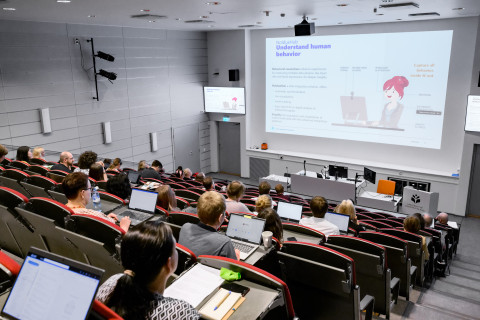Recent research on early inflammatory activation in neurodevelopmental disorders was presented at a workshop organised by the University of Eastern Finland, Kuopio Brain & Mind and Neurocenter Finland on May 27. Basic science talks were accompanied by perspectives from autistic people, educational professionals, and clinicians.
The ERA-NET NEURON funded MINERVA consortium led by Professor Tarja Malm from the University of Eastern Finland held its second Annual Meeting in connection with the Translational Research on Neurodevelopmental Disorders workshop, which gathered a total of 60 participants.
The busy programme included presentations by MINERVA partners on microglia-neuron interactions and the cross-disorder risk gene CACNA1C in relation to autism spectrum disorders (ASD). Disruptions caused by maternal infections during highly sensitive periods of brain development may compromise the delicate balance between brain excitation and inhibition, impacting the continuum of clinical outcomes. In severe cases, this can impair the quality of life for individuals with ASD.
The presentations represented an exceptional variety of advanced techniques to explore these issues.
“The talks covered several methodological approaches to investigate how genetic factors and maternal immune activation interact to drive ASD traits. The combination of human-based 3D in vitro models, genetically engineered in vivo models with sophisticated behavioral readouts and work on clinical samples and data comprise a truly translational approach to tackle the mechanisms underlying vulnerability. Importantly, there is a lot we can learn from the views and needs of the individuals with ASD,” Malm said.
Heta Pukki, M.Ed., NGO activist, highlighted the general principles of participatory autism research. “Autistic people should be involved throughout the research cycle, from defining the goals to funding application, publication and beyond, following already existing good practice. Too often we are just added to project plans as an afterthought, and brief consulting roles are offered, which provides only a semblance of participation,” Pukki said.
According to Pukki, autistic individuals should ideally be engaged in research through their representative organisations, thus ensuring they too have a community behind them, instead of engaging with research communities and universities as individuals only. In addition, more autistic people should be able to contribute with their professional expertise and not just as lived experience experts.
She also reminded that while biomedical research may bring relief to some within the autism spectrum, most autistic people don’t define their personalities, emotions and passionate interests as symptoms of disease, and don’t agree with the treatment of so-called ‘core symptoms’ as a priority, considering co-occurring health issues as the most desirable targets, instead.
Professor Eija Kärnä from UEF’s School of Educational Sciences and Psychology introduced research-based strategies to support the social participation of children with autism in peer interactions within inclusive classrooms. Senior Researcher Maija Castren from the University of Helsinki presented neural mechanisms in one neurodevelopmental disorder, Fragile X syndrome.
Updates were heard from other Finnish ERA-NET NEURON projects as well. Senior Researcher Takashi Namba and Professor Jaan-Olle Andressoo from the University of Helsinki introduced their research on neocortical development and GDNF modulation in schizophrenia, respectively. At the end of the day, student presentations highlighted strong national research in the field of neurodevelopmental disorders.
The workshop was supported by several sponsors who presented new animal models, automated analysis of behavior, and pharmacotherapies.
The core message of the day was summarised by Eero Rissanen, Director of Neurocenter Finland, quoting the WHO definition of brain health: "Brain Health is the state of brain functioning across cognitive, sensory, social-emotional, behavioral, and motor domains, allowing a person to realize their full potential over the life course, irrespective of the presence or absence of disorders."






